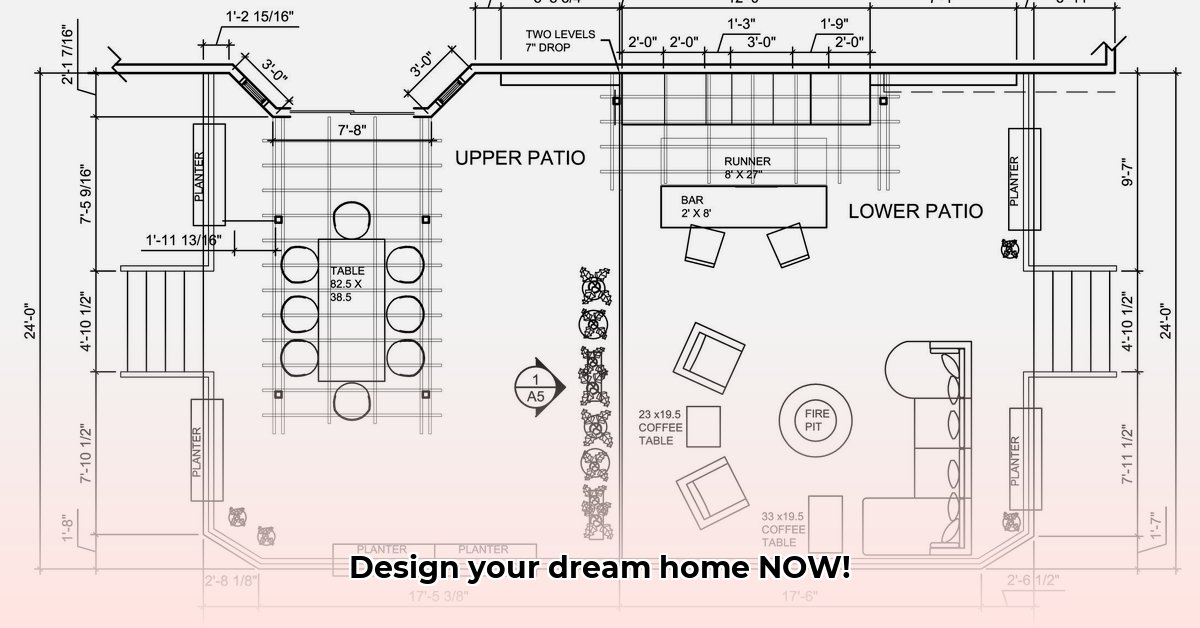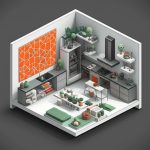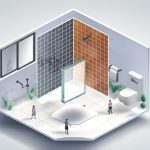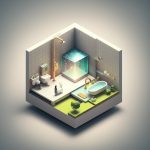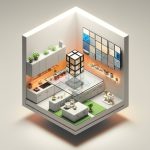Planning your dream home layout can be exciting, and fortunately, numerous online tools are available to simplify the process. Effective furniture placement is essential to creating a stylish and comfortable living space. This article explores the best online room planners, comparing their features, costs, and ease of use. For precise measurements, check out this helpful resource on floor plan measurements. Whether you’re a DIY enthusiast, a design student, or a professional designer, this comprehensive guide will help you discover the ideal tool to bring your vision to life. We’ll cover everything from intuitive drag-and-drop functionality to realistic 3D models, ensuring you can select the planner that best fits your requirements and budget.
Floor Plan and Furniture Layout: Choosing the Right Online Tool
Ready to design your dream home? A crucial initial step is perfecting your floor plan and furniture layout. Numerous online tools are available, but how do you choose the best one? Let’s assess some popular choices to find the perfect fit for your needs.
We’ll compare online tools for crafting floor plans with furniture placement, covering features, prices, and overall usefulness for diverse users, from weekend DIYers to experienced designers. Consider this your ultimate guide to selecting a digital design assistant.
Planner 5D: Easy to Use, Great for Beginners
Planner 5D is an excellent starting point if you’re new to room planning software. Its straightforward interface allows even first-time users to navigate it quickly. The drag-and-drop system for furniture placement is simple and intuitive. The free version offers a decent selection of furniture which allows you to create a basic layout. Upgrading to a paid plan unlocks more detailed furniture and sharper, photorealistic 3D renderings, a worthwhile consideration for users with ambitious design plans.
Pros:
- Simple, intuitive design that is easy to master, even for beginners.
- A free version allows you to try it before committing.
- A large furniture library, especially with a paid subscription.
- HD visualization.
Cons:
- The free version can be somewhat limited if you have ambitious plans.
- While extensive, some may find the generic furniture selection limiting if aiming for unique aesthetics.
Roomstyler 3D Home Planner: Visualize Your Space
Roomstyler 3D Home Planner allows you to lay out any room you want, from a bedroom or kitchen to a home office. This tool is unique in that it allows you to make a list of room items, such as the number of walls, doors, windows, products, and materials, to make planning as accurate as possible.
Pros:
* Huge canvas used like a drawing board
* Can draw your walls or drag shapes
* Large collection of furniture, textures, materials and accessories
Cons:
* Some furniture, textures, materials and accessories are locked behind a paywall
Plan Your Room: Quick and Simple Floor Plans
Need a basic floor plan quickly? Plan Your Room is designed for speed and simplicity. It gets the job done without a huge learning curve, focusing on essential features to help you plan efficiently. This tool is ideal for smaller projects needing a quick visual of how your furniture might fit. However, it might feel too restrictive for larger, more complex designs. Consider it a digital sketch rather than a photorealistic 3D model.
Pros:
- Incredibly easy to learn, allowing you to start using it in minutes.
- Ideal for small projects and quick mockups.
- Gets the job done efficiently without a steep learning curve.
Cons:
- Limited customization and furniture options.
- Not ideal for complex designs or large floor plans.
SketchUp Pro: Professional-Grade Power
Let’s consider SketchUp Pro, a powerhouse program designed for serious design professionals. It requires dedication and isn’t a beginner-friendly tool, demanding a steeper learning curve. Interior designers and architects, however, will find it invaluable. SketchUp Pro allows you to create incredibly detailed, realistic models, and even import custom-designed furniture! Remember to invest time in learning its capabilities and consider the cost of the software. Tutorials and workshops are available to help users make the most of the software.
Pros:
- Unmatched detailing and customization capabilities.
- Allows importing custom models for unique designs.
- The standard for many professional designers.
- Helpful for refreshing an existing room or building an extension.
Cons:
- Steep learning curve – prepare to dedicate time to mastering the software.
- Potentially overkill for simpler projects.
- Expensive subscription fees.
Floorplanner: A Good Balance
Floorplanner strikes a balance between ease of use and advanced features, offering a rich toolset for creating detailed floor plans within a relatively user-friendly interface. This makes it a strong choice for both professionals and serious DIYers. While not as overwhelmingly complex as SketchUp Pro, it offers many of the same advantages, making it suitable for various skill levels. The tool offers standard definition (SD) exports for 2D and 3D images, which is fine for DIY layouts. Furthermore, tutorials are available if you feel creatively blocked with your layouts or to help design your dream home.
Pros:
- A balanced approach to ease of use and powerful features.
- Offers sophisticated features without an overly complex interface.
- Suits a wide range of skill levels.
- Array of furniture, flooring, wall coverings and accessories.
Cons:
- Might still feel overwhelming for complete beginners.
- Not essential if you only need a simple floor plan.
MagicPlan: Use Your Phone’s Camera!
MagicPlan stands out by utilizing your phone’s camera to generate floor plans by capturing images of your room automatically. This feature saves considerable time measuring, especially for existing spaces. It’s a fantastic time-saver for creating quick floor plans, but might not be optimal for detailed edits or highly complex designs. Real estate agents find this feature incredibly useful for quickly creating property listings.
Pros:
- Fast floor plan creation using your phone’s camera.
- Saves manual room measurements.
Cons:
- Editing tools are less advanced than the other tools mentioned here.
- Detail level might be limited depending on photo quality.
Canva: Design, Not Precision
Canva excels in graphic design, offering capabilities for creating floor plans. It shines in creating visually appealing presentations rather than intricate, measured layouts. Although it provides creative freedom, it may lack the precision needed for accurate furniture placement and room dimensions. If visual appeal is your primary concern and accuracy is secondary, it’s worth considering. Canva Whiteboards has an unlimited canvas to house all your great ideas. You can even integrate a mood board into your floor plan complete with color swatches and decor pictures to have a clearer visualization of your ideal space.
Pros:
- Simple and intuitive design tool.
- Numerous templates and design options to make your plan visually appealing.
- Unlimited canvas.
Cons:
- Not designed for accurate measurements and precise furniture placement.
- Lacks advanced features needed for complex designs.
Home Design 3D: Freemium with a Walk-Through
Home Design 3D is a popular app with a “freemium” option for simple room layouts. The app has both 2D and 3D modes, as well as a 3D walk-though tour to visualize the space you have designed.
Pros:
- 2D and 3D modes
- 3D walk-through tour
Cons:
- Cannot save or download work in “freemium” version
- Ads in “freemium” version
Floor Plan Creator: Multi-Platform Precision
Floor Plan Creator offers a fast and precise tool to create and share floor plans. Move rooms and symbols with a mouse, or set their sizes and distances numerically when high precision is required. A 3D mode allows you to see your project with as many floors as you need, and the camera can be freely positioned.
Pros:
- Multi-platform use
- 3D mode
- Can import existing plan and use as a template
Cons:
- Straight Walls Only
Choosing the Right Tool: A Quick Comparison
The best tool for you depends on your needs. Consider your experience, project size, and desired level of detail.
| Tool | Price Model | Ease of Use | 3D Capabilities | Furniture Variety | Best For |
|---|---|---|---|---|---|
| Planner 5D | Freemium | High | Good | Extensive | DIYers, Beginners |
| Roomstyler 3D Home Planner | Freemium | Medium | Good | Extensive | Visualizing Specific Styles and Brands |
| Plan Your Room | Free/Paid | Very High | Basic | Moderate | Quick, Simple Designs |
| SketchUp Pro | Subscription | Medium | Excellent | Vast | Professionals |
| Floorplanner | Subscription | Medium | Good | Extensive | Serious DIYers, Pros |
| MagicPlan | Freemium | High | Basic | Limited | Real Estate Agents |
| Canva | Freemium | High | Limited | User-Uploaded | Visual Presentation, Mood Boarding |
| Home Design 3D | Freemium | Medium | Good | Moderate | Simple Layouts, Walk-Through Tours |
- Gray Kitchen Backsplash Ideas: Find Your Perfect Gray Tile - December 11, 2025
- Glass Wall Tiles For Bathroom: A Stylish, Durable Choice - December 10, 2025
- Glass Mosaic Kitchen Backsplash: Add Shimmer and Style - December 9, 2025
